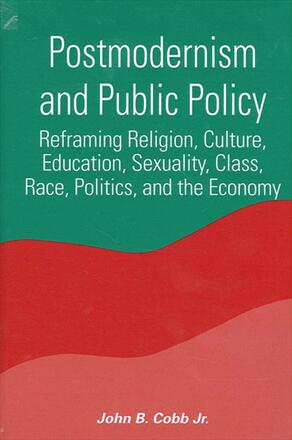
Postmodernism and Public Policy
Reframing Religion, Culture, Education, Sexuality, Class, Race, Politics, and the Economy
Alternative formats available from:
Develops a naturalistic postmodern perspective to make constructive proposals about a wide range of topics now in public discussion.
Description
One of America's preeminent systematic theologians, John B. Cobb Jr. examines a range of social issues in his latest groundbreaking work, Postmodernism and Public Policy. Cobb uses a naturalistic postmodern perspective to make constructive proposals about a wide range of topics in the public eye.
Postmodernism and Public Policy shows how a postmodern Christianity can contribute positively to thinking about religious and cultural pluralism, and how this can give direction to the educational enterprise. It proposes ways of understanding sex, gender, and race that take diversity seriously without lapsing into a debilitating relativism that inhibits political action. Arguing for a shift from individualism to thinking of persons-in-community, it proposes that the world be organized from the bottom up in communities of communities, and spells out what this implies for the political and economic orders and the relationship between them. Cobb shows that formulations on all these topics can be coherently interconnected and he develops the implications of such thinking for some specific ethical and political issues that now trouble the United States, such as abortion, physician-assisted suicide, and homosexuality.
John B. Cobb Jr. is Professor Emeritus, Claremont School of Theology and Claremont Graduate School, Co-Director of the Center for Process Studies, and Co-Founder of Mobilization for the Human Family. He is the author of many books, including The Earthist Challenge to Economism: A Theological Critique of the World Bank.
Reviews
"Written with the confidence of a master, the book generates a gravitational force field all its own: at once humble in its tone and stunning in its sweep." — Catherine Keller, author of Apocalypse Now and Then: A Feminist Guide to the End of the World
"Postmodernism is not just an intellectual development; it is a cultural reality making it very difficult to address social issues that require system change and not just cultural criticism. Cobb addresses this in a creative way." — Warren Copeland, Wittenberg University